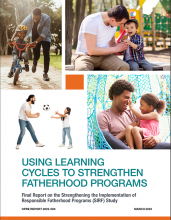Found 254 resources.
0
0
0

Federally funded Responsible Fatherhood programs work with fathers to promote healthy relationships and marriages, strengthen parenting practices, and help fathers attain economic stability. For programs to improve fathers’ outcomes, they need to be able to recruit fathers, engage them in services, and keep them actively participating in program activities. However, it is challenging for programs to achieve these participation goals. The Strengthening the Implementation of Responsible Fatherhood Programs (SIRF) study was designed to strengthen programs and build evidence on promising...
Topics: Family engagement, Healthy homes, Legislation & Policy, Low-income, Research, Stability
 Shared by Sandra Ware
on Jun 1, 2023
Shared by Sandra Ware
on Jun 1, 2023 0
0
0

The 2022 Federal Broadband Funding Report summarizes and analyzes FY21 data collected from across the federal government. Broadband funding under the Bipartisan Infrastructure Law was appropriated in FY22 and will be included as part of the 2023 Report. Due to the data collection timeline, Federal Broadband Funding Reports currently report on the previous fiscal year rather than the fiscal year they are released in.
To accompany this report, NTIA developed a consolidated data dashboard to assist in the analysis and reporting for FY21 federal broadband investments. The full dashboard with...
Topics: Broadband, Data sharing, Legislation & Policy, Low-income
 Shared by Sandra Ware
on Jun 1, 2023
Shared by Sandra Ware
on Jun 1, 2023 0
0
0

Every May, Ascend recognizes the importance of raising awareness about mental health and the multifaceted ways that it impacts family prosperity and well-being. Even as Mental Health Awareness Month comes to a close, we are committed every day to uplifting the drumbeat across our community that calls for an end to mental health stigma, making strides to ensure that families can access quality services, and advocating for policies that support families' unique mental health needs.
Join us in the national movement to raise awareness about mental health by exploring some of our new...
Topics: Depression, Dual-generation, Education, Legislation & Policy, Mental health, Research
 Shared by Sandra Ware
on Jun 1, 2023
Shared by Sandra Ware
on Jun 1, 2023 0
0
0

The findings from a Syracuse University study linking universal school meal policies with improved school attendance for young students provides a strong case for expanding free school meals, according to school nutrition and attendance experts.
Topics: Attendance, Early childhood, Education, Food insecurity, Health, Legislation & Policy, Low-income, Nutrition, Youth
 Shared by Sandra Ware
on Feb 23, 2023
Shared by Sandra Ware
on Feb 23, 2023 0
0
0
Using data from the 2018 Survey of Income and Program Participation (SIPP, which has monthly income amounts for 2017) and the National Bureau of Economic Research TAXSIM model, we estimate how accurately data from the first quarter of the year can predict credit amounts a person will ultimately qualify for based on their annual characteristics. Low-income people are more likely than higher-income people to experience financial difficulties, so we focus our analysis on families with children at some point in the year with incomes below 200 percent of (twice) the federal poverty level (FPL). If...
Topics: Legislation & Policy, Low-income
 Shared by Sandra Ware
on Dec 1, 2022
Shared by Sandra Ware
on Dec 1, 2022 0
0
0
People with disabilities have a place to turn to find information on COVID-19. They can contact the Disability Information and Access Line (DIAL) to find vaccine locations, make appointments and arrange for transportation. Trained staff at DIAL can also help people with disabilities track down community supports to help with independent living, such as services that help with health care benefits, financial assistance, housing, food and more. DIAL, operated as a collaboration between a consortium of organizations serving people with disabilities and USAging, is funded by the Administration...
Topics: Advocacy, Asset building, Disabilities, Legislation & Policy, Mobility, Stability, Supportive housing
 Shared by Karina George
on Jul 15, 2022
Shared by Karina George
on Jul 15, 2022 0
0
0
This is the recording of a small group discussion on the Build American, Buy American (BABA) Act and its implications for PHAs. The notes were taken to document feedback from CLPHA members on the Federal Register Request for Information Notice on the Build America, Buy America Act. The information documented below does not constitute CLPHA’s official position or response to the RFI.
Topics: Housing, Legislation & Policy, Place-based
 Shared by Malcolm Guy
on Jun 21, 2022
Shared by Malcolm Guy
on Jun 21, 2022 0
1
1
In this webinar, we heard from the Housing Authority of the City of Austin about how they fund and sustain their resident programs. Head of Strategic Initiatives and Resource Development, Catherine Crago, discussed how their nonprofit subsidiary, Austin Pathways, assists with blending and braiding financing, including corporate and philanthropic funding and in-kind gifts.
This webinar is part on an ongoing series sponsored by the Housing Is Working Group. It is a collective of public housing authorities and non-profit organizations working in health, education, and housing sectors coming...
Topics: Advocacy, CLPHA, Data sharing, Housing, Housing Is Working Group, Legislation & Policy, Supportive housing, Sustainability
 Shared by Karina George
on Jun 21, 2022
Shared by Karina George
on Jun 21, 2022 0
0
0
When public libraries and public housing authorities intentionally join forces, the benefits are real and lasting for those living in public housing. This session highlights the partnership between Cuyahoga Metropolitan Housing Authority (CMHA) and Cleveland Public Library (CPL). CMHA and CPL executive leaders will discuss how their agencies strategically aligned their vision for impact and are meeting community needs through the library’s free and accessible resources. CMHA and CPL leaders will also share strategies for creating effective cross-sector partnerships that can drive greater...
Topics: Advocacy, Asset building, CLPHA, Education, Family engagement, Homelessness, Housing, Legislation & Policy, Literacy, Low-income, Supportive housing
 Shared by Karina George
on Jun 17, 2022
Shared by Karina George
on Jun 17, 2022 0
0
0
The Vancouver Housing Authority collaborated with a Federally Qualified Health Center and a homeless crisis response system to develop a network of scattered-site and site-based supportive housing. This moderated discussion will cover how VHA paired Housing Choice Vouchers and public housing with a Medicaid-funded supportive housing benefit to serve people identified by the community’s Coordinated Entry as needing supportive housing. Speakers will also discuss the challenges faced through the process, model adjustments made, and evaluation of the work through matching housing data and...
Topics: Advocacy, CLPHA, Data sharing, Family engagement, Health, Healthy homes, Homelessness, Housing, Legislation & Policy, Low-income, Research, Stability, Sustainability
 Shared by Karina George
on Jun 17, 2022
Shared by Karina George
on Jun 17, 2022 0
0
0
This panel discussion will examine the results of efforts to significantly expand the reach of HUD’s Family Self-Sufficiency Program through partnerships between the nonprofit Compass Working Capital and the Boston and Cambridge Housing Authorities. Panelists will discuss their program model and its evaluation, how they have scaled up FSS, what results they have experienced to date, and where they plan to go from here. An FSS program participant will participate in the panel and share their perspective on how the program has benefitted them.
Topics: Advocacy, Asset building, CLPHA, Early childhood, Education, Housing, Legislation & Policy, Research, Supportive housing
 Shared by Karina George
on Jun 17, 2022
Shared by Karina George
on Jun 17, 2022 0
0
0
This session will review the extent to which local jurisdictions engaged with school districts in the 2016-17 Affirmatively Furthering Fair Housing (AFFH) process and preview the potential for PHAs to engage with school districts and school data in the upcoming renewal of the HUD AFFH process.
Topics: Advocacy, Attendance, CLPHA, Data sharing, Education, Family engagement, Housing, Legislation & Policy, Research, Sustainability
 Shared by Karina George
on Jun 17, 2022
Shared by Karina George
on Jun 17, 2022 0
0
0
The Low Income Investment Fund (LIIF) will moderate a unique cross-sector panel of housing and early care and education (ECE) experts on strategies and best practices for co-locating ECE facilities within affordable housing developments. Discussion of specific financing techniques and site design considerations from existing co-located facilities will provide attendees lessons on policy and programmatic changes needed to incentivize co-location. Panelists include innovators in affordable housing development, government and public sectors, early care and education operations, and community...
Topics: Advocacy, Broadband, Child welfare, CLPHA, Family engagement, Food insecurity, Health, Housing, Legislation & Policy, Low-income, Nutrition, School-readiness, Supportive housing, Sustainability
 Shared by Karina George
on Jun 17, 2022
Shared by Karina George
on Jun 17, 2022 0
0
0
Building off discussions during previous Summits, this panel will highlight research and promising practices on cash assistance for low-income individuals and families, including income supports stemming from the pandemic.
Topics: Advocacy, CLPHA, Funding, Housing, Legislation & Policy, Research
 Shared by Karina George
on Jun 17, 2022
Shared by Karina George
on Jun 17, 2022 0
0
0
Tim Higashi and Stuart M. Butler look at several examples of innovative ways in which communities responded to COVID-19 by using a variety of special techniques to “braid and blend” funds from different programs and sources to address pressing health, education and other service need. They argue that such special flexible budgeting techniques should not end with the pandemic, but should become an integral feature of budget procedures to enable communities to reach social goals
Topics: Advocacy, Community development, COVID-19, Data sharing, Funding, Legislation & Policy
 Shared by Housing Is
on May 25, 2021
Shared by Housing Is
on May 25, 2021 0
0
0
Over the past year, the United States Conference of Mayors and the Brookings Institution, along with the Project for Public Spaces have worked together to capture a new model of growth that is emerging in cities and the particular roles that mayors can play.
This handbook offers concrete strategies for mayors and their administrations to facilitate the rise of innovation districts—small geographic areas within cities where research universities, medical institutions, and companies cluster and connect with start-ups, accelerators, and incubators. They reflect profound market and demographic...
Topics: Community development, Legislation & Policy, Research, Workforce development
 Shared by Housing Is
on Oct 20, 2020
Shared by Housing Is
on Oct 20, 2020 0
0
0
The Bureau of Labor Statistics estimates that from 2014-2024, employment in healthcare occupations is projected to grow by 19 percent and add about 2.3 million jobs. Yet, these workers often do not earn enough to live in communities they serve.
The report, which focuses on the affordability challenges faced by healthcare workers, highlights five fast growing healthcare occupations: dental assistant, emergency medical technician, home health aide, licensed practical nurse and physical therapy aide.
Topics: Funding, Legislation & Policy, Stability, Workforce development
 Shared by Housing Is
on Oct 20, 2020
Shared by Housing Is
on Oct 20, 2020 0
0
0
Chicago’s troubling homicide rate could be significantly reduced through a massive increase in state spending for Chicago schools. That's just one of the proposals floated Monday by a prominent University of Chicago economist Jens Ludwig. With a substantial commitment, he says homicides could be reduced by nearly 60 percent. Illinois is dead last when it comes to the percentage of education dollars provided by the state to its cities. Ludwig believes adding $1.7 billion dollars would not only bring Illinois up to the national average, but could substantially reduce gun violence as well....
Topics: Child welfare, Community development, Education, Funding, Legislation & Policy, Preventative care, Youth
 Shared by Housing Is
on Oct 15, 2020
Shared by Housing Is
on Oct 15, 2020 0
0
0
Federal, state, and local policies focused on neighborhood improvement have long emphasized the need for community organizations to share information, coordinate activities, and collaborate in the delivery of services. These partnerships build “community capacity,” as a way of promoting local problem solving and community well-being over the longer term. But, there has been only limited research on which patterns of neighborhood networks are most conducive to implementing effective collective work. This report uses social network analysis, drawing from a network survey, and extensive field...
Topics: Communications, Community development, Data sharing, Legislation & Policy, Partnerships
 Shared by Housing Is
on Oct 15, 2020
Shared by Housing Is
on Oct 15, 2020 0
0
0
Innovative public housing authorities (PHAs) are collaborating with college access partners and community colleges to increase postsecondary educational achievement for low-income residents and college students experiencing homelessness. This report elevates 11 shared learnings from a recent convening of these five pioneering PHAs and their postsecondary collaborators, and offers a series of recommendations to policy makers, PHAs, and philanthropic organizations seeking to develop emerging cross-sector collaborations between housing and education organizations. The report also includes an...
Topics: CLPHA, Education, Housing, Legislation & Policy, Low-income, Partnerships, Post-secondary, Stability
 Shared by Abra Lyons-Warren
on Oct 6, 2020
Shared by Abra Lyons-Warren
on Oct 6, 2020 0
0
0
A discussion with attorney Alex Elson from the National Student Legal Defense Network and director of FAIL STATE, Alex Shebanow, to talk about predatory for-profit institutions and how that affects low income residents.
About the film:
Over five years in the making, FAIL STATE investigates the for-profit college industry and the decades-long reports of student loan abuse within the sector. The film’s central thesis: aided by a cabal of politicians, nationwide disinvestment in public colleges and universities, and an unscrupulous desire to maximize profits at all costs, for-profit colleges...
Topics: Advocacy, CLPHA, Education, Housing Is Working Group, Legislation & Policy, Low-income, Post-secondary
 Shared by Abra Lyons-Warren
on Feb 12, 2020
Shared by Abra Lyons-Warren
on Feb 12, 2020 0
0
0

In California, more than 3.7 million students were eligible for free or reduced priced school meals in the 2017-2018 school year. For many of those students, school meals are the primary source of regular access to healthy food. When the bell rings at 3:00 or lets out for summer break, many of those students go home to nutritional uncertainty or high-calorie, low-nutrient foods.
For many low-income families, the out-of-school-time food access gap increases family stress: limited budgets are stretched further to cover food, rent, utilities, transportation, medications, and chidcare costs....
Topics: Advocacy, Early childhood, Food insecurity, Health, Healthy homes, Housing, Legislation & Policy, Low-income, Nutrition, Out-of-school time, West Coast, Youth
 Shared by Linda Lu
on Dec 4, 2019
Shared by Linda Lu
on Dec 4, 2019 0
0
0

Trends in Housing Assistance and Who it Serves
Topics: Community development, Disabilities, Education, Funding, Health, Homelessness, Housing, Legislation & Policy, Low-income, Partnerships, Research, Seniors, Workforce development, Youth
 Shared by Keely Stater
on Sep 10, 2019
Shared by Keely Stater
on Sep 10, 2019 0
0
0
More than a half million renters have been evicted in Los Angeles County over the past eight years, according to a new report by Public Counsel and the UCLA School of Law that calls on county supervisors to adopt permanent rent control measures.
Topics: Homelessness, Housing, Legislation & Policy, Low-income, Research, West Coast
 Shared by Housing Is
on Jun 13, 2019
Shared by Housing Is
on Jun 13, 2019 0
0
0
The Trump Administration is publicly weighing plans to gradually lower the official poverty line by applying a smaller cost-of-living adjustment each year. Doing so would be unjustified for several reasons.
Topics: Child welfare, Food insecurity, Legislation & Policy, Low-income, Nutrition, Stability
 Shared by Housing Is
on Jun 11, 2019
Shared by Housing Is
on Jun 11, 2019 
